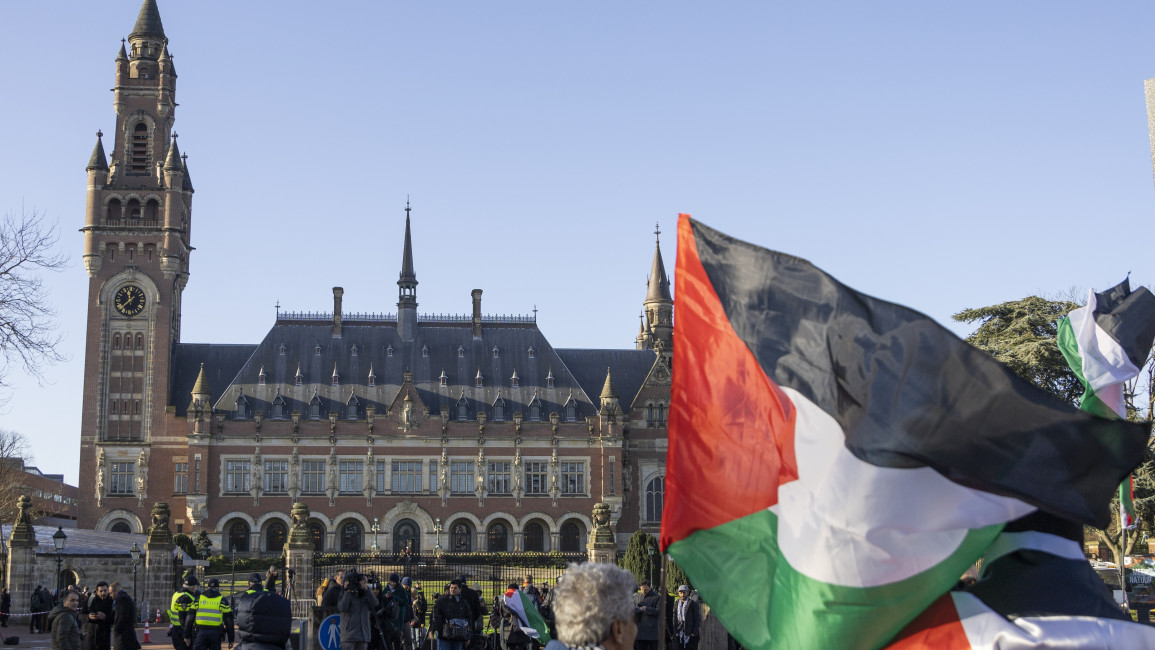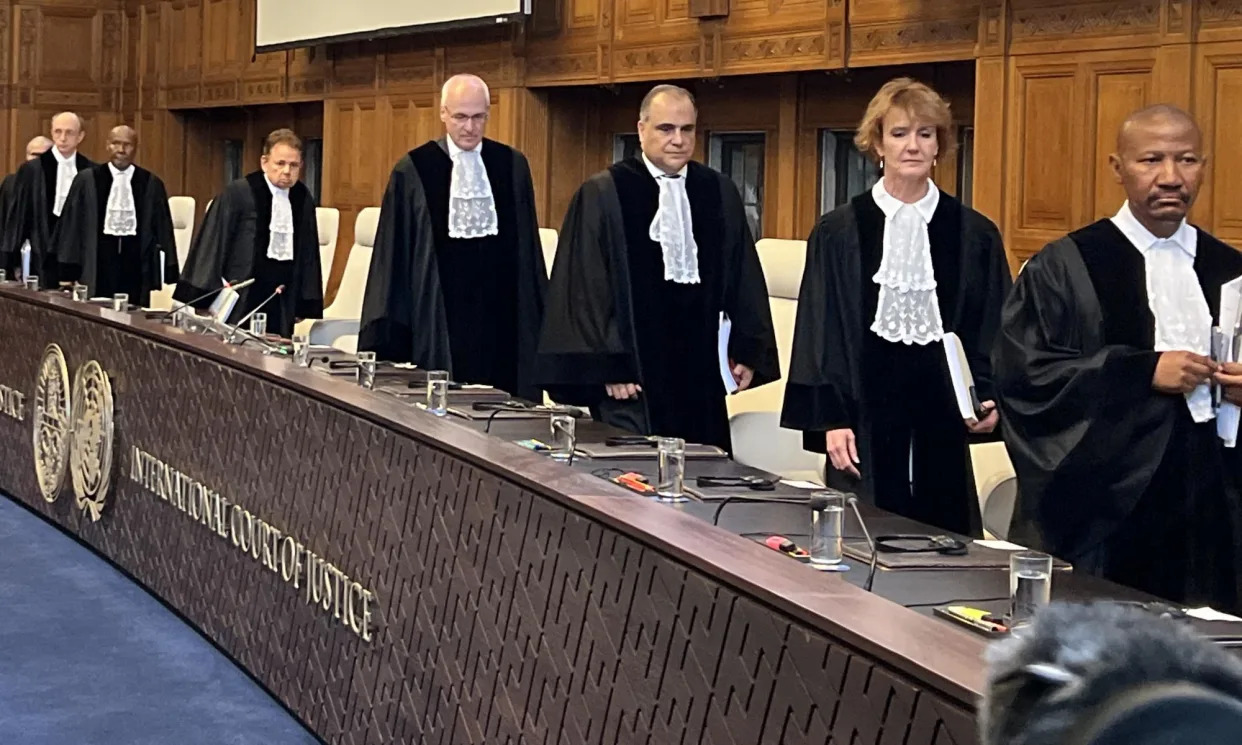A lawyer representing Palestine's team on the International Court of Justice case says the UK should take steps to stop arms trade with Israel.
The New Arab Staff
29 July, 2024

The International Court of Justice issued a landmark ruling on Israel's 57 year occupation of Palestinian land in July [GETTY]
A top human rights lawyer said the UK must stop arms sales to Israel to ensure compliance with the recent ruling from the world court, which found that Israel’s occupation of Palestinian land was illegal.
The International Court of Justice (ICJ) said that Israel's occupation of the West Bank, East Jerusalem and Gaza was in breach of international law and ordered it to immediately halt and withdraw all settlement activity.
Professor Philipe Sands, a member of Palestine’s legal team for the ICJ case, told The Guardian that the UK should cease arming Israel to comply with the court's 19 July ruling that UN member states should not "render aid or assistance in maintaining the situation created by Israel’s illegal presence in the occupied Palestinian territories".
Sands, who teaches law at University College London, said that the advisory "precludes sale of military material which could be used directly or indirectly to assist Israel in maintain its unlawful occupation of the occupied Palestinian territories".
The landmark ICJ ruling issued a damning verdict on Israel's 57-year-old occupation of Palestinian land, which described the situation in the occupied West Bank as an "apartheid system", and comes as Israel's brutal offensive against Gaza nears its tenth month.
The Gaza war has again returned the spotlight onto Israel’s discriminatory and aggressive policies towards Palestinians and triggered accusations of Israeli crimes against humanity.
Over the course of the war, there have been increasing calls for the UK government to halt authorising weapons or parts of weapons to Israel over concern that it could be used by the Israeli army or air force in its assault on Gaza.
The government has approved over $614 million of weapon sales to Israel since 2015 in so-called single-issue licences, while companies export more under open licences, according to rights groups.
Foreign Secretary David Lammy earlier this month said that his office was carrying out a "comprehensive review of Israel’s compliance with international humanitarian law".
While he was in opposition, Lammy called on the then Conservative government to suspend arms sales to Israel, particularly in the wake of the Israeli drone attack that killed three British aid workers in Gaza.
Israel is facing accusations in a separate case at the ICJ brought by South Africa accusing it of committing genocide against the Palestinian people in the war on Gaza.
Related
AnalysisAlessandra Bajec
The ICJ had been investigating Israel’s actions in the Palestinian territory since 2022, following a UN general assembly resolution that came about after Palestine was authorised to sit at the UN general assembly.
The new Labour government has yet to issue a formal response to the ruling and has said it is being carefully considered.
It is expected that the UN general assembly will hold a vote on the outcome in the coming months. The UK has previously been accused of opposing the ICJ’s hearing of the case on Israel and the Palestinian territories.
Last August the UK submitted a length legal opinion against the case, which was denounced by Palestinian officials and international humanitarian lawyers.
Sands, who has authored books on genocide and war crimes, said that the UK should not vote against the ICJ advisory opinion “if the government is true to its word on respecting international law”.
The Labour led government has committed to recognising a Palestinian state but has not specified a timeline.
Speaking to the House of Commons on 18 July, Lammy said that Palestinians had been “in purgatory for decades” and “denied the state that is their inalienable right”.
Haroon Siddique Legal affairs correspondent
Sun, 28 July 2024

The UN’s top court found that Israel’s settlement policies and occupation of the Palestinian territories were in breach of international law.Photograph: Anadolu/Getty Images
The UK should stop arming Israel in order to comply with the historic advisory opinion by the UN’s top court that member states should not “render aid or assistance” to the occupation of the Palestinian territories, a lawyer who represented Palestine has said.
In a broad and damning ruling published this month, the international court of justice (ICJ), found that Israel’s settlement policies and occupation of the territories were in breach of international law. It also said UN member states were under an obligation to neither recognise the occupation as lawful nor abet it.
With the UK already under pressure over the sales of arms to Israel during its military offensive in Gaza, which was launched in response to the 7 October attacks and has killed almost 40,000 Palestinians, Prof Philippe Sands KC, a member of Palestine’s legal team for the case at the ICJ, said the court’s opinion had important ramifications for the UK.
“The most immediate issue is the obligation in the advisory opinion on the states, which includes the United Kingdom, not to aid or assist in the maintenance of the current situation in the occupied territories of the West Bank, including [East] Jerusalem,” said Sands.
“That legal obligation precludes sales of military material which could be used directly or indirectly to assist Israel in maintaining its unlawful occupation of the occupied Palestinian territories.”
The foreign secretary, David Lammy, has said officials are, on his instructions, carrying out a “comprehensive review of Israel’s compliance with international humanitarian law” and has signalled that he is considering banning some arms sales to the country.
Related: UN court orders Israel to end its occupation of Palestinian territories
Sands said the ICJ’s ruling, as an advisory opinion requested by the UN general assembly, was not directly binding as such on the UK or other individual member states, but would be “recognised as an authoritative statement of the law and one that the UN and its specialised agencies will follow as law”.
Sands, who is a professor of law at University College London and a visiting professor at Harvard law school, said the ruling also affected the legality of imports from Israeli settlements to the UK and other countries.
“Anything that is produced in the occupied territories, such as food, or that is sold there over the internet, is in principle subject to the international prohibition, if it can be said to aid or assist in the maintenance of the unlawful occupation,” he said.
Sands said such ICJ opinions were routinely followed by a vote two to three months later at the UN general assembly as to whether they should be adopted and that the UK’s stance would be instructive. The UK voted against the ICJ referral and then submitted a 43-page legal opinion opposing it.
“How does the UK vote on that [the opinion]?” said Sands. “Will it vote against, or will it abstain? If the government is true to its word on respecting international law, given the nature and detail of the ICJ advisory opinion, you would expect them, at the very least, not to vote against. This could well be an early issue in relations with the United States, which will almost certainly vote against, despite the fact that the US judge was part of the large majority.”
Among the arguments advanced by Sands during the ICJ hearing in February was that on Palestinian right to self-determination. In its advisory opinion, the court referred to “the realisation of the right of the Palestinian people to self-determination, including its right to an independent and sovereign state”.
While Labour has committed to recognising a Palestinian state, it has not set a timescale and has said this would be “as a contribution to a renewed peace process which results in a two-state solution”.
Sands said: “Ultimately, the recognition of a state is a political matter, not a legal obligation, so there is a discretionary element. Nevertheless, the ICJ judges have clearly stated that self-determination means that the Palestinian people ‘have the right to an independent and sovereign state’. About 150 states (out of nearly 200) have recognised Palestine as a state, the UK is part of a small and diminishing group that refuses to do so.”
After the ICJ advisory opinion, the UK Foreign, Commonwealth and Development Office said on 19 July it was “considering it carefully before responding” and “respects the independence of the ICJ”.
No comments:
Post a Comment